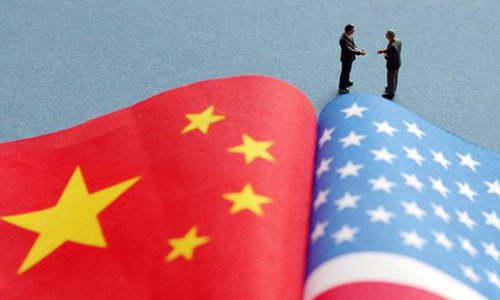Can the US be trusted to end unilateralism with China?
Source:Global Times Published: 2020/1/13 23:15:48

Chinese and US trade officials make attempt at striking a trade deal to defuse an increasingly bruising trade war that has rattled global markets and presented mounting challenges to both economies. Photo: VCG
Despite the optimism surrounding the expected signing of the phase one trade deal between China and the US, there has been growing skepticism over how far the deal could go to ease trade tensions between the world's two largest economies. While some US media outlets have raised questions over whether China will deliver on its commitments, observers from the Chinese side also have their concerns over trusting the US.It seems hard to believe that the US fondness for reckless unilateralism will really grind to a halt especially when news about new development from the Trump administration targeting China's tech sector comes out in such an intense way. For instance, last week just saw the US Commerce Department impose new export controls on artificial intelligence software, while this week the Interior Department is reportedly planning to halt nearly 1,000 civilian drones due to the so-called China spying risk.
On the whole, of course, the signing of the phase one trade deal will be a win-win for both China and the US. Even US Treasury Secretary Steven Mnuchin had to acknowledge in a recent interview the benefits of the phase one trade deal for the US economy in 2020. "There's no question that US-Mexico-Canada Agreement (USMCA) and the China deal are going to add significantly to growth," Mnuchin said. By considering the US-China trade deal and the USMCA as a growth factor, the treasury secretary is actually suggesting that trade remains crucial for the US economy.
Nevertheless, it should be made clear that trade itself is mutually beneficial, otherwise no one would like to do business with the other who is only seeking to maximize its gain. So even though the US is already the world's strongest economic power with the most advanced science and technology and financial hegemony, unilateral pressure and protectionism still won't help its economy benefit from trade, especially with China. Just look at Boeing's drag on the US economy, which may affect the US GDP by 50 basis points, according to Mnuchin. While the impact of the 737 Max scandal is huge, the US-China trade war has definitely played a part in hurting the company's performance.
In this sense, trade is never one-sided. Whether the US can make full use of the trade ceasefire to lift its economy hinges not only on what the US can gain from the trade deal, but also on what it can give to China. It is no longer a question whether the US side can trust China on delivering its promises, but whether the US itself is trustworthy in terms of ending its unilateral behavior, as reckless unilateralism has already undermined its credibility in the global arena.
Now with the phase one trade deal to be signed this week, many are looking forward to the second phase, wondering what kind of orders will be placed during the next phase of talks. Yet, aside from all these superficial details, for China, the essence of the trade talks is always to see to what extent the US can abandon in its unilateral practices. Certainly China will be more than willing to expand trade with a country that truly abandons unilateralism instead of a country that could reverse a trade deal at any moment.
Posted in: GT VOICE,CHINA-US